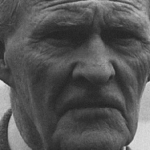In a world where all the heroes
are pilots with voices like God
he brought her a strand of some woman’s
hair to wear on her wing.
She looked sideways at the ground
silent behind the cloudy film covering
her eyes knowing she would be his
forever. They cruised the city nights
each one spiralling away from the other
but always coming home to gather stories.
dark streets bright tavern lights drunks
filled with beer in the gutters.
The flicker of stars shaped like a hunter’s
arrow bent stars that twinkled like babies’
eyes. No babies for them. She was an outcast.
He a loner. A perfect pair.
Winters had made him wise
and he avoided the single nests of summer.
He told her about things she could see.
How the dismal cover of clouds roils and explodes
and the ground aches like an old woman’s knee.
How wood rots against the tide
good for hunting grub.
How to fade and fall back into the wind.
He translated her pulse
into near-language. Their poetry so personal
even Peterson’s Field Guide could not tap it.
Only a stray hunter saw it.
Shook his head once thinking it a trick
of wind and wing then turned his eyes north
to search for the simple flight
of Brant or Canadian. Those patterns
he could easily understand.
Sucked its delicate cusps of mold
sang anti social songs as if they were humans.
When he flicked his handsome head
to catch the drift of wind
she even managed a single tear.
She waited through days and nights
of grief. Circled the city less
then settled on the wires.
The metallic conductor captured her eyes.
She remembered how he proudly sang her name
as he pranced from pole-top to KV line.
One last fluff of feathers. One sigh
for all the unnested summers.
One single scratch
Then she fell smiling.
A trick he had taught her.




















Comment form: